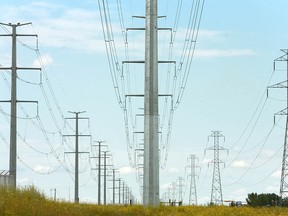[ad_1]
The head of Alberta’s largest electricity retailer expects provincial power prices will head lower in the new year, as market volatility eases and new generation comes online.
But the longer-term outlook in the sector — including the effect of the incoming federal Clean Electricity Regulations — is much harder to predict.
And Enmax Corp. CEO Mark Poweska has concerns about the federal drive for provincial power grids to reach net-zero emissions by 2035, instead of the 2050 time frame favoured by the Alberta government.
“The Clean (Electricity) Regulations, the way they’re drafted right now, we have affordability concerns for our customers,” Poweska said in an interview.
“We believe it doesn’t recognize regional differences across Canada and different starting points, and we think it needs to . . . I don’t think 2035 is a realistic date for Enmax.”
Enmax, which is owned by the City of Calgary, is facing myriad issues that are sweeping across the electricity system in Alberta today.
Power demand is increasing and is expected to continue climbing as the country strives to attain net-zero emissions by 2050.
Technology in the industry is evolving. More renewable energy is coming into Alberta’s deregulated market, even with the temporary pause placed by the UCP government on approving new projects.
Against this backdrop, the provincial government is reviewing several aspects of the electricity system.
“We are at the cusp of the transition,” Poweska said. “More people will be using electricity for more things, at the same time as we’re trying to decarbonize the system.”

One of the most significant issues in 2024 will be the tug of war between the federal and provincial governments over the pace of decarbonizing Alberta’s grid.
The Trudeau government aims to see provinces reach net-zero status (or close to it) by 2035. The incoming CER presents a major challenge for Alberta, along with Nova Scotia and Saskatchewan — provinces that rely heavily on natural gas or coal to generate power.
The Smith government opposes the federal rules, calling them unconstitutional and too expensive for consumers, while maintaining they will threaten the reliability of the system.
For Enmax, which has both generation and retail operations in Alberta, the draft regulations are a cause for concern.
The utility has 1,522 megawatts of electricity generation capacity in the province, with 86 per cent coming from natural gas and 14 per cent from wind last year.
Enmax has lowered its own emissions by 65 per cent from 2015 and is on track to reach a 70 per cent drop by the end of this decade.
But Poweska, who joined Enmax in September 2022 after previously working as CEO at Hydro One in Ontario, said the Calgary-based company has set its sights on reaching net-zero by 2050.
It is exploring the potential of carbon capture, utilization and storage at its Shepard Energy Centre — the largest gas-fired generating facility in the province — along with adopting more renewables and other emerging technologies, including hydrogen and energy storage, to reach net-zero.
The accelerated federal timelines wouldn’t let Enmax look at some technologies, such as small modular reactors or CCUS, as the corporation wouldn’t have enough time to get such developments through the permitting process and operating by 2035.
“The way the clean electricity regulations are written right now restricts our options for new technologies,” he said.
As proposed, the federal regulations would allow gas-fired generating facilities built before 2025 to continue to run unabated (without carbon capture and storage) for 20 years. There are also provisions for limited use of unabated gas generation beyond 2035.
Final regulations are expected next year.
In Enmax’s public comments made last month during federal consultation on the CER, the corporation warned about the consequences of the proposed regulations on power prices and system reliability.
“Our analysis is that Alberta will have upwards of 1,600 hours in 2038 of supply shortfall, which will result in brownouts somewhere in the province,” the utility wrote.
Enmax noted its own modelling suggests Alberta wholesale power prices will be in the $500 per megawatt-hour (MWh) range in 2035 under the CER, climbing to $700 three years later “due to the limited run time allowed for fossil-fired units and the premature retirement of existing gas units.”
Without the CER, it says prices are forecast to be within the $170 per MWh range.
The possibility of Ottawa using its criminal enforcement powers as part of the CER is also a concern, Poweska said.
“The federal government says, ‘Well, we wouldn’t do that.’ But as the CEO, I work on a show-me basis, not a trust-me basis, and what the act says is, ultimately, there could be criminal charges,” he said.
“To make an investment in a technology that isn’t as advanced, to meet a stringency requirement that has never been achieved in the world . . . I think it makes it uninvestable.”

While companies across the sector in Alberta are trying to navigate the changes around policy, Enmax’s diverse operations mean it must deal with a shifting landscape on several fronts.
“They are not a vertically integrated utility — we don’t have that in Alberta anymore — but (Enmax) are the closest thing to it, in the sense they operate in all aspects of our system,” said University of Calgary economist and electricity expert Blake Shaffer.
“They are affected by all of the changes going on, not just components of it.”
For Alberta consumers, one of the most immediate issues is the high cost of monthly electricity bills.
Wholesale power prices have averaged $139 per MWh this year, down nine per cent from the same period last year, but far above the $47 per MWh reported in 2020, and $101 per MWh average in 2021
Poweska expects wholesale prices will ease in the coming year after volatility rippled through the market in 2023.
“We do see a bunch of new generation coming on over the next few months, which I think will take a lot of that volatility out of the market for 2024,” he said.
“If you look at the . . . forward market prices, you do see those come down a lot.”
Electricity consultancy EDC Associates forecasts Alberta Power Pool prices will drop to around $89 per MWh next year as more generation comes online, and then dip to $70 to $73 per MWh in 2025.
“We see prices coming down right through the next five years, declining off these highs,” said EDC chief executive Duane Reid-Carlson.
“The relief is coming. It’s going to be here for a while. And then, the direction that it goes to by 2030 is going to be dictated by the carbon policies that the federal government and provincial government are trying to figure out.”
Chris Varcoe is a Calgary Herald columnist.
-
 Alberta pushes back against Ottawa’s new Clean Energy Regulations
Alberta pushes back against Ottawa’s new Clean Energy Regulations -
 Varcoe: Premier warns of blackouts under feds’ net-zero power plan
Varcoe: Premier warns of blackouts under feds’ net-zero power plan -
 Yedlin: Clean Energy Regulations would carry huge consequences for Alberta
Yedlin: Clean Energy Regulations would carry huge consequences for Alberta
[ad_2]
You can read more of the news on source



